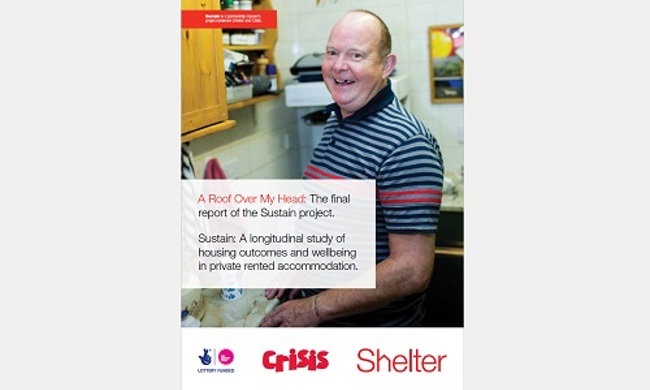Sustain: a longitudinal study - Interim Report (2012)
10.04.2012
The Sustain project is a longitudinal qualitative research study of people’s wellbeing and outcomes in private rented sector (PRS) housing. It focuses on the experiences of people who have been resettled in private rental tenancies after being homeless, exploring different aspects of this experience, and sustainability of the PRS as a housing option.
Key findings
- People have limited knowledge about sources of help for those in housing need and generally find it hard to find support.
- Specific barriers faced when approaching local authorities for support, especially among single households, included a lack of ID or debt accrued from previous tenancies.
- Types of support offered to people in housing need varies considerably, by region, organisation and by individual, regardless of need.
- When people were given specific support to move into the PRS, they were more likely to feel positive when that support was perceived as being of a higher level – for example, given practical help to find a PRS tenancy rather than simply being given a list of landlords.
- At the same time, some people had a limited understanding of the support they had actually received to move into the PRS and, in some cases, the implications of accepting it. This included not being aware of the legal implications of support – for example, their local authority having discharged their homelessness duty for them into the PRS.
- Most moved into the PRS because they felt they had no other choice, due to being told they would be unlikely to access social tenancies, or being refused help by the local authority.
- A number of barriers meant people found it hard to access tenancies on their own. These included: not having a rent deposit, landlords not accepting housing benefit claimants, and/or not accepting rent deposit or bond schemes, not having a guarantor and property scarcity.
- Supply of PRS accommodation differed by region and affected people’s decision making behaviour. For example, more choice in Greater Manchester meant that people tended to choose properties based on area. In comparison, people found it challenging to find a property in London and reported they were often forced to take the first place they could afford in order to avoid being homeless.
- Overall, people often accepted the first tenancy they could find where a landlord accepted their application. As a result, some moved into unsuitable homes or areas – for example, moving to new areas resulting in isolation from informal support networks.
- Availability of basic furniture had an impact on how people could live and manage budgets. Some people had very little or no furniture and reported sharing beds.
Reference
Smith, M (2012) Sustain: a longitudinal study of housing wellbeing in the private rented sector - Interim Report. Crisis and Shelter: London.
See also: A Roof Over My Head (2014)

